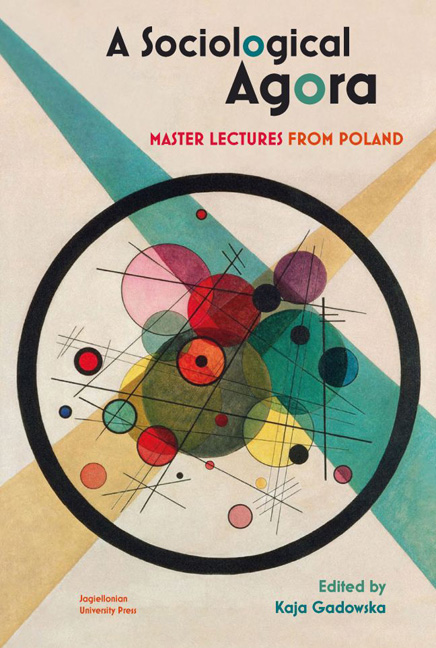Book contents
- Frontmatter
- Contents
- Society in a Time of Pandemia: Postmodern Problems from a Social and Humanistic Perspective
- Trust and Risk in the Time of Pandemia
- The Mythologized Populist Imagination, Carnival Rebellion, and the Fate of Liberal Democracy
- Applied Feminism: Women’s Rebellion and Identity
- On Law and its Interpretative Artifacts
- On Legal Nihilism Once More: Lessons from Poland
- Minima iuridica: Reflections on certain legal (un)obviousnesses
- Community—Meaning What?
- An Essay on Welfare: Problematic and Debatable Issues
- Sources of an Ecclesiastical System Success
- About the Authors
- About the Editor
- About the Translator
- Polish Sociological Association
Society in a Time of Pandemia: Postmodern Problems from a Social and Humanistic Perspective
Published online by Cambridge University Press: 01 March 2024
- Frontmatter
- Contents
- Society in a Time of Pandemia: Postmodern Problems from a Social and Humanistic Perspective
- Trust and Risk in the Time of Pandemia
- The Mythologized Populist Imagination, Carnival Rebellion, and the Fate of Liberal Democracy
- Applied Feminism: Women’s Rebellion and Identity
- On Law and its Interpretative Artifacts
- On Legal Nihilism Once More: Lessons from Poland
- Minima iuridica: Reflections on certain legal (un)obviousnesses
- Community—Meaning What?
- An Essay on Welfare: Problematic and Debatable Issues
- Sources of an Ecclesiastical System Success
- About the Authors
- About the Editor
- About the Translator
- Polish Sociological Association
Summary
BY WAY OF INTRODUCTION
On New Year's Eve of 2019, China informed the world of atypical cases of a pulmonary infection first appearing in the city of Wuhan, but now diffused throughout Hubei province. Some ten days later, on January 9, 2020, the World Health Organization (WHO) revealed that the cause of the spreading illness is a new Coronaviridae virus. Yet by the next day, the first fatality was already reported by China, by January 13 the first case outside of China was confirmed, and by January 27 the first cases were identified on the European continent. In early March the coronavirus was found to have spread to 84 countries, the number of cases globally had exceeded 95,000, and the number of deaths had risen to 3,000. Poland's “patient zero”—who did survive—was noted on March 4, but the first registered death from this new strain of SARS-CoV-2 occurred soon thereafter on March 12, 2020. Just the day before, the WHO had declared this a pandemic.
Concurrent with the early warning signs in Poland and in reaction to the threat posed by the pandemic, the Jagiellonian University called off all in-person classes for students and advised online instruction and interactions. The university's 656th academic year was upturned: literally from one day to the next, classes moved on March 12, 2020 from physical to virtual spaces. The COVID-19 era had begun.
A few days later, on March 15, Poland's borders were closed to air and rail traffic; on March 25 (with scarce exceptions) a ban on movement in public spaces was instated. Gatherings of more than two persons were forbidden, restrictions on public transportation were introduced, and the number of participants in a religious service or ceremony was limited to five. As of April 1, minors unaccompanied by an adult were not allowed in public. Parks, waterfronts, and beaches were closed.
Over the course of a dozen days at the cusp of March–April 2020, nearly all forms of social life were fundamentally disrupted. With the first, strictest lockdown (an old word with new meaning), a stillness set in which, in Poland, evoked the morning of December 13, 1981 when the communist government declared Martial Law. The country plunged into both silence and shock at how quickly everyday social behavior surrendered to administrative orders.
- Type
- Chapter
- Information
- A Sociological AgoraMaster Lectures from Poland, pp. 7 - 22Publisher: Jagiellonian University PressPrint publication year: 2023



